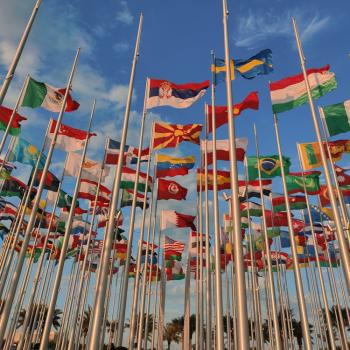
In the story of The Monkey’s Paw, as with many similar stories, the protagonist, Mr. White, finds that one must be careful for what they wish for, because wishes often are fulfilled through means which bring all kinds of terrible consequences with them. The wish might be for something good, but the good is corrupted by how the wish is fulfilled. Thus, when Mr. White is given a magical monkey’s paw, he is told the paw will grant him three wishes. Initially, he saw no reason to use it, but after he is encouraged by his son, Herbert, to wish for £200, he makes his first wish. The next day, he finds his wish is fulfilled, but the way it is fulfilled is terrible: his son was killed in an accident at work, and while his son’s boss denies any responsibility to Herbert’s death, he gives Mr. White £200 as a way of compensation for Mr. White’s loss. Later, after his son’s funeral, and at the encouragement of his wife, Mr. White wishes that his son was brought back to life. Once again, the wish is fulfilled; his son is brought back to life, but he suffers from all the damage done to his body in his accident, so that his son’s new life is one of great tragedy and horror. In the end, Mr. White uses his third wish to undo his second, saving his son from a fate worse than death. The moral of the story, as with many other stories which engage similar themes, is clear. We must be careful with our wishes. We might one day get exactly what we wish for, but we will do so in a way which we do not like, as the fulfillment of our wish makes things worse than they were before. What is not stipulated in our wishes can and will come back to haunt us. We must make sure what we wish for is good, but also, that our wish is executed in a good manner. That is easier said than done, as there will be all kinds of things we do not consider as we try to have our desires fulfilled. Evil, after all, acts as a parasite on the good, using some good as a means to bring about its corruption and damage to the world.
It appears that those who have desired for the Roe vs. Wade decision to be overturned will get their wish. While the case has not yet been given a final ruling, and things could change between now and that ruling, we have a draft copy of what appears to be the majority opinion in Dobbs vs. Jackson Women’s Health Organization, an opinion which indicates that the Supreme Court will base its decision by overturning Roe vs. Wade. The opinion likewise makes it clear that it will leave open the possibility for many other precedents being overturned on the same basis being used to determine its ruling in Dobbs vs. Jackson.
It is important to note that what has been released is not the final decision of the court. There is the possibility, however slim, that one or more of the justices, before the ruling is finalized, might change their judgment, rendering the draft moot. There is a greater possibility that the draft will be (or has been) rewritten, and some of the worst arguments of the opinion will be excised. Nonetheless, it is likely, what is indicated in the draft will stick, and not only will Roe vs. Wade be overturned, the method used to justify that decision will be one which give more power to the states, to give states the right to do whatever they want to do so long as the Constitution, in its most literal, most strict reading, does not deny them such power. This leaves much of what we have seen coming from the Supreme Court for the last several decades in question with many of their previous decisions will have a means of being overturned.
We have already seen indications of what this means, as we have seen politicians speaking about how they think many accepted norms, because they were decided by the Supreme Court without properly recognizing states’ rights, could be overturned if the state decides (for example, in Indiana, one senator suggested that if a state decided, they could outlaw interracial marriage). Once states’ rights are made supreme, and that the federal government is seen as unable to curb the worst inclinations of individual states, it is not difficult to see what happens next. Not only will the United States not be so united, states will turn into little fiefdoms, where they will have absolute control over their citizens in all things not expressly stated in the Constitution (which, truth be told, is most things). If a state wanted to limit its citizens from traveling to other states, such as saying pregnant women cannot leave their state so long as they are pregnant in order to make sure they will not have an abortion, that, in theory, is something the state would be allowed to do.
Even those who might want Roe vs. Wade overturned, because they object to abortion, will find that the laws which are made to restrict abortion will likely have far more consequences than they considered, similar to the way the wishes Mr. Wilson were granted were done in ways he did not foresee. All we have to do is look at the laws being written, and enacted, with the hope that Roe vs. Wade is overturned; for example, women who have miscarriages could be jailed or fined, if they cannot prove they did not do something which made their miscarriage happen. Similarly, the inability to appreciate all the complexities surrounding abortion have led to the introduction of laws which will leave women who have justified medical reasons for an abortion unable to have their needs met (such as women with ectopic pregnancies). And of course, while some states will support bans on abortions, others will take the opportunity not only to allow abortions to continue, but to reinforce their support for abortion, as laws which would limit government engagement and material support for abortion will not be able to be enforced.
Overturning Roe vs. Wade, and promoting a poorly construed hermeneutic for interpreting the Constitution, will leave the United States in chaos. It is quite possible that this chaos is what many want. For, it seems that many support the overturning of Roe vs. Wade, not for any substantial moral reasons, but because they see the authoritarian power it will give to the states. Indeed, it would seem the so-called pro-life movement, followed by many with true belief, was used by politicians as a trojan horse to establish an authoritarian transformation of the United States. They see Roe vs. Wade was capable of being reversed, and once it is reversed, they believe the power of the federal government to stop them from turning individual states into dystopian nightmares would be eliminated.
We should have learned to be careful for what we wish for, because, if our wish is not carefully thought out, we will not be prepared to receive all that our wish fulfilment brings with it. So many rights were established in the 20th century, so many rights which people take for granted. If Roe vs. Wade is overturned, it will be done so without proper preparation made for its aftermath. States will have the power to make laws which counter all the social advancements of the 20th century. If they want to put in place an authoritarian dystopia, so long as nothing they do runs contrary to the most strict, textual reading of the Constitution (using originalistic hermeneutics), they will be free to do so. If they want to remove Miranda Rights, they could do so, because the Constitution does not specifically deny them that ability. If they want to cut themselves off from federal programs, such as Medicaid, what, again will now stop them? If they want to force everyone in their state to join the National Guard, can that be stopped? If they want to deny people the right to be married if they are poor, or sick, or elderly, can the Supreme Court say no?
So much which has been accepted as a given will be thrown out if and when Roe vs. Wade is overturned, and once that happens, we will truly come to see what lay behind the desire to overturn precedent. It will prove the drive many had to remove the precedent established in Roe vs. Wade was never about abortion. If it was, more activity would have been done to deal with the problem of abortion on a social level instead of fighting the social programs which could have and would have lessened its use (just as more would have been said and done by the so-called pro-life leaders against the Trump Administration, when its policies led to many pregnant women losing their babies because they were seen to have little to no rights of their own).
As a Christian, I am against elective abortion. But I also believe the best way to deal with abortion is to deal with the root causes which lead women to feel the need to have an abortion, and not just making those causes worse as women find themselves despairing of their existence by living in a dystopian state. The so-called pro-life movement, with its emphasis on laws, has not worked. All it does is encourage authoritarian understanding of the law, and so , encourage authoritarians as they see each particular state as potential place to exercise their absolute control. The tradition of Augustine and Aquinas, which recognizes that sometimes the solution to social problems, and great evils, lies not in laws but social engagement, must be taken seriously. Such an engagement has been shown to reduce abortion use (while purely legal means has not). Recognizing that abortion is a problem does not mean we need to accept all suggested solutions, especially if they cause more, not less problems when executed. This is exactly what we risk with the overturning of Roe vs. Wade. Getting what we wish for might be our own undoing.
Stay in touch! Like A Little Bit of Nothing on Facebook.
If you liked what you read, please consider sharing it with your friends and family!













